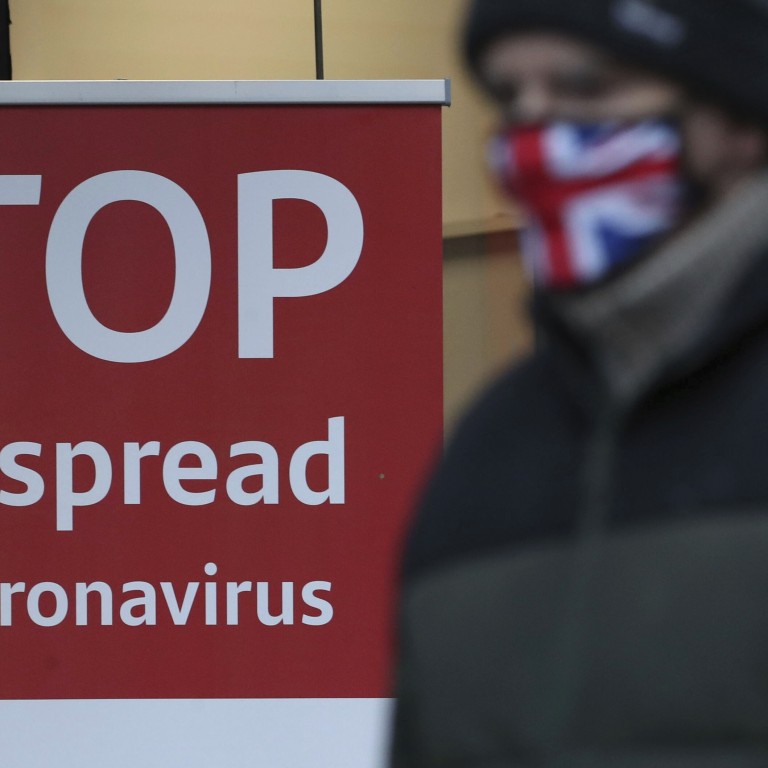
Coronavirus: UK government offers US$6.2 billion to support businesses as third lockdown begins
- The French government, under pressure for lagging behind EU neighbours in rolling out vaccinations, promised to dispense jabs much more quickly
- Russian President Vladimir Putin and German Chancellor Angela Merkel discussed the possibility of jointly producing coronavirus vaccines
Britain’s economy now looks likely to tip back into recession – shrinking in the final quarter of 2020 and the first quarter of 2021 – after suffering a record 25 per cent fall in output in the first two months of lockdown in 2020. The government offered a £4.6 billion (US$6.2 billion) support package for businesses to soften the blow.
“This will help businesses to get through the months ahead – and crucially it will help sustain jobs, so workers can be ready to return when they are able to reopen,” finance minister Rishi Sunak said.
Cabinet Office minister Michael Gove told Sky News on Tuesday morning that he could not say precisely when the lockdown, announced as lasting six weeks, would be lifted, warning of “very, very difficult weeks”.
The measures will be reviewed from February 15, he said, but the government cannot “predict with certainty” whether they will be lifted then.
“I think it is right to say that as we enter March we should be able to lift some of these restrictions but not necessarily all,” he added.
The measures began in England on Tuesday morning and will become law in the early hours of Wednesday morning. Scotland, Wales and Northern Ireland are also bringing in strict lockdowns including school closures.
Overall, Britain has been among the worst hit in the world by the outbreak, with some 2.7 million cases and 75,431 deaths.
Johnson was widely criticised for hesitating too long about the measures, particularly school closures.
But he won some support on Tuesday. The Times wrote: “Mr Johnson said that the weeks ahead would be the hardest yet. But at least we have given ourselves a fighting chance.”

France accelerates vaccine roll-out
The French government, under pressure for lagging behind EU neighbours in rolling out Covid vaccinations, promised on Tuesday to dispense jabs much more quickly and catch up.
Health Minister Olivier Veran said more than 2,000 people had been vaccinated on Monday – compared to 264,000 so far in Germany – and that the “cruising speed of vaccinations will catch up with our neighbours in the coming days”.
The French government has been playing catch-up with its neighbours since the start of an EU-wide vaccination drive on December 27.
Opposition politicians have slammed the slow progress as a “scandal” and said France had become the laughing stock of the EU.
President Emmanuel Macron, under pressure to take personal responsibility, met officials including Prime Minister Jean Castex on Monday to discuss the logjam.
“By Thursday we will increase numbers in a major way,” Veran told RTL radio, saying that “we will be on an exponential curve”.
Coronavirus: South Africa strain ‘more of a problem’ than UK variant
France would now “amplify, accelerate and simplify” its vaccination strategy, he said.
Veran said vaccinations for people over 75 years of age who are not in care homes would be authorised by the end of January, covering five million people. He said the campaign would also be widened to include firefighters and home helpers over 50.
France was currently taking delivery of 500,000 doses of a vaccine developed by Pfizer per week, Veran said. Once approved for the EU, 500,000 doses of a vaccine by Moderna would be added every month, he said.
Opposition politicians were not satisfied by the minister’s promises, with Xavier Bertrand, president of the northern Hauts-de-France region, saying: “I want the government to tell us the truth: Exactly how many doses have been ordered by France?”
Bertrand said he had “the unpleasant impression that there is a lack of vaccines”, while the Socialist deputy mayor of Paris, Emmanuel Gregoire, asked: “Where are the doses now?”
Merkel, Putin discuss joint vaccine production
Russian President Vladimir Putin and German Chancellor Angela Merkel discussed the possibility of jointly producing coronavirus vaccines in a phone call, the Kremlin said on Tuesday.
“Issues of cooperation in combating the coronavirus pandemic were discussed with an emphasis on the possible prospects for joint production of vaccines,” the Kremlin said in a statement.
The Kremlin added that an agreement was reached to “continue contacts on the issue” between the two countries’ health ministries and specialised agencies.
The two leaders also discussed the settlement of the conflict between Kiev and pro-Russian separatist forces in eastern Ukraine, that has largely remained at a standstill since peace accords were signed in 2015.
Both Russia and Germany have recently started mass vaccination drives at home to curb the spread of the coronavirus and avoid reimposing nationwide lockdowns.
When Asian states plan to vaccinate their people for Covid-19
While Germany is using the vaccine jointly developed by Pfizer and the Mainz-based company BioNtech, Russia has put into mass circulation its home-made jab – Sputnik V.
Russia announced the registration of Sputnik – named after the Soviet-era satellite – in August, before the start of large-scale clinical trials, raising concerns over the fast-tracked procedure.
Some critics have described it as a tool to bolster Russia’s geopolitical influence.
Russia started a mass vaccination drive in early December, making the jab first available to high-risk groups including medics, teachers and the elderly.
Alexander Gintsburg, the director of the state-run Gamaleya research centre that developed Sputnik, on Tuesday said more than 1 million people in Russia have received the jab so far.
Moscow also sent batches of its vaccine to Belarus, Serbia and Argentina and announced that 2.6 million doses will be supplied to Bolivia but acknowledged that it was struggling with production capacity.
Additional reporting by Agence France-Presse

